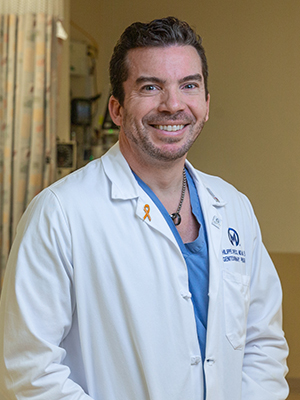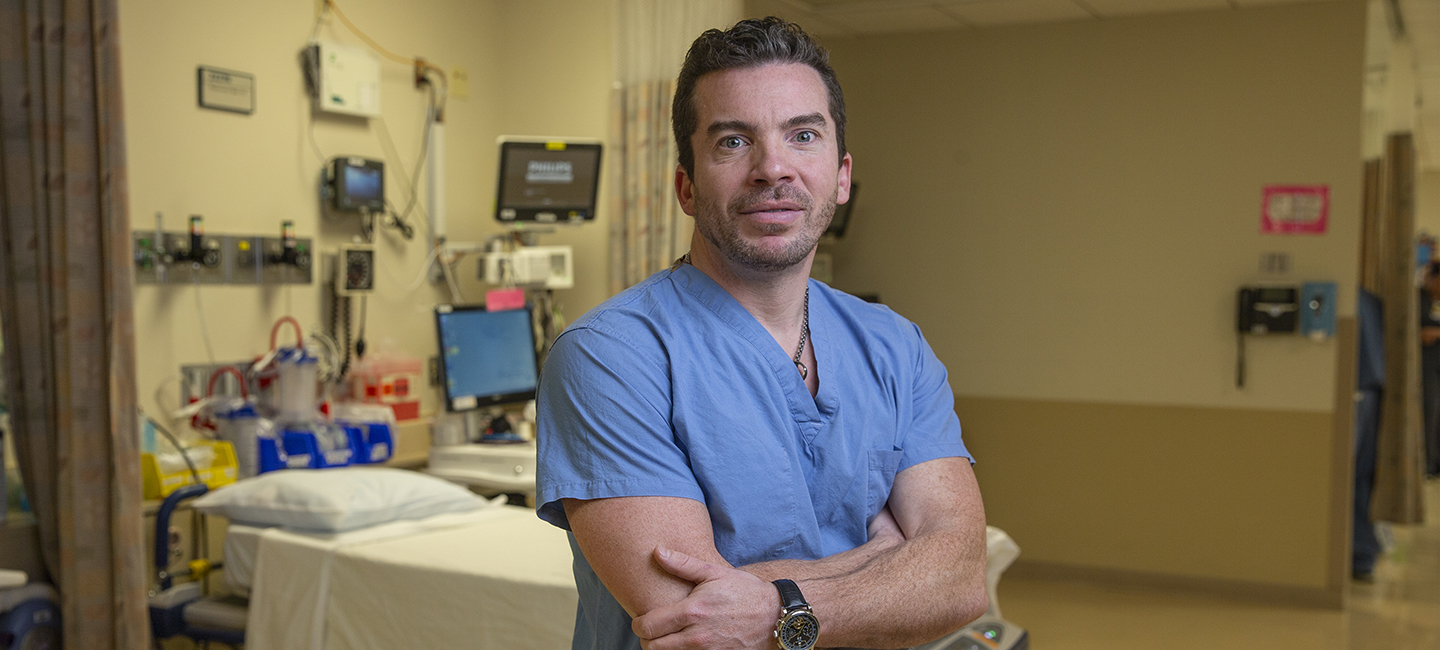Why Penile Cancer Poses Research Challenges
In some ways penile cancer could be considered “good news,” “bad news,” although the condition is in no way a joking matter for the approximately 2,000 men in the United States diagnosed each year. The fact that cancer of the penis is very rare certainly is a relief. The bad news, however, is that progress in discovering new and better ways of treating penile cancer has been hampered by its rarity, because of the limited number of patients that can be recruited to clinical trials.
The reported mortality risk is fairly low, with an approximately 90% five-year survival, because there are many patients who present with nonaggressive cancers. “At Moffitt Cancer Center the cancers we see here are very different. We often see patients in advanced cases where the cancer has gone into the lymph nodes, so those patients do much worse, and at that point we’re talking about five-year survival rates of 25%-30%,” said Dr. Philippe Spiess, assistant chief of Surgical Services and senior member, Department of Genitourinary Oncology.
These low survival rates for individuals with advanced penile cancer are disappointing, notes Spiess, adding this is where the importance of research comes into play.
“The more we understand about this disease, the more we are realizing that the current medications to treat it, the chemotherapies we are using, are not as effective as we once thought. And, unfortunately, for patients with a rare cancer like this, we are not able to do the large studies necessary to better understand the natural history of the disease, the prognosis and how patients do on certain therapies. Because of that we have to review data in large data registries or establish large collaborations in order to advance the field.”
LOW RESPONSE RATES CALL FOR MORE RESEARCH
Generally, there has been a lack of new treatments for penile cancer. “There have been a few studies that have shown some novel forms of targeted therapies which may have a benefit for a subset of patients. But when you scrutinize the studies, we find response rates typically in the range of about 30%-40%. So, this is quite disappointing and suboptimal,” said Spiess.
In 2018 Spiess and colleagues, including collaborators from Italy, looked at factors that predicted survival in patients with advanced penile cancer. “The bottom line is that radiation and chemotherapy did not improve survival in the analysis,” said Spiess. “That’s a disappointing thing; it was a point of reflection for us. And it said to us, clearly, we may help some patients with chemotherapy — but the group of patients benefitting from chemotherapy is much lower than we once thought. It’s a frustrating thing as a clinician, and that’s where you want to take a next step and not just accept this is as good as we can do. We clearly need to do better.”
This led Spiess to initiate and serve as principal investigator across all North America (USA, Canada) sites as part of the largest international study designed to advance the care of patients with advanced penile cancer and attempt to determine whether having surgery after chemotherapy, or after chemotherapy with radiotherapy, is better than having surgery alone and whether having additional surgery to remove the pelvic lymph nodes that are farther away from where the cancer first appeared is better than not having this additional surgery. This study is called the InPACT (International Penile Advanced Cancer Trial); the trial is open across all sites that are part of the European Organisation for Research and Treatment of Cancer. At Moffitt this is Clinical Trial 19319, and it is historically the first of its kind to be developed.
INTERNATIONAL STUDY GAINS TRACTION
“This study is truly innovative because it took about five years to get enough momentum for the study — to get recognition and approval from the National Cancer Institute as a trial that was worthy of adoption,” said Spiess. “And it took an effort across Europe, the United Kingdom and the United States to collaborate. It was clear to us when we put this trial together that the only way we would be successful was if we collaborated across numerous centers. The goal is about 50 centers across both North America and Europe, and across Latin America in specific places.” As of Jan. 1, 2020, the study has opened at 10 sites in the United States and Canada and 19 patients have been enrolled in the study. “It looks as if the study is beginning to gain traction and that we are going to be able to answer these meaningful questions,” said Spiess.*
Additionally, the study will look at human papillomavirus (HPV) and other factors to see if they help predict whether patients could respond to certain treatments.

Spiess hopes the study will provide opportunities to conduct future studies. “From this study we are identifying other institutions that have an interest and commitment to do this kind of research. The goal of myself and the other organizers of the study is that it will form the basis of centers of excellence that care for this disease nationally and globally.”
Moffitt’s Genitourinary Oncology Program has a high patient volume, focuses on treating even the rarest malignancies and many program physicians are fellowship-trained in urologic subspecialties.
Dr. Jad Chahoud, recently joined the growing program. Chahoud’s clinical expertise includes advanced stage genitourinary malignancies, with a specific focus on advanced kidney and penile cancer. He received funding from the Conquer Cancer Foundation through the ASCO Young Investigator Award in 2018 to study viral and immune biomarkers for metastasis and poor survival in penile squamous cell carcinoma.
“Jad has been a wonderful complement to our program because he is interested in developing new medical therapies for penile cancer,” said Spiess. “It’s a nice complement that we can work together and elevate this research program here.”
UNDERREPORTED; HUGELY IMPACTFUL
How might penile cancer affect a person’s sex life? “The reality is, this topic is underreported,” said Spiess. “I put a book together on highlights in this field and asked a well- regarded behavioral therapist to write a chapter on this specific topic. He came back to me and said, ‘Phil, there’s not much literature for me to write a chapter about it!’”
Patients with penile cancer often are not being asked those questions of how the condition has affected them, continued Spiess. In his clinic, “we don’t necessarily do counseling, but the topic has become an integral part of our conversation before we do any form of treatment when we diagnose patients. And, similarly, we follow patients for that.
“Surgery can be hugely impactful on their sexual relationships, on their marital relationships, relationships with partners or interactional relationships. When you are talking about younger patients, in addition to the diagnosis of cancer and the impact of that, the impact on their sex life and the ability to be close with their partners in that manner is huge. Fortunately, so many of the treatments we are doing today for smaller and better defined lesions is about preserving as much of the sexual function as possible, using appropriate, less-aggressive surgical or nonsurgical treatment options. The field has evolved a lot in the last 10 years.”
HPV AND PENILE CANCER
HPV is probably the strongest risk factor for developing penile cancer, and it is estimated that 60%-80% of penile cancers are HPV related.
Spiess and Dr. Anna Giuliano, have collaborated for several years in the area of HPV vaccination and cancer prevention through review articles, presentations and other projects. Giuliano is the founding director of the Center for Immunization and Infection Research in Cancer at Moffitt. Her work has contributed significantly to HPV vaccine protection against multiple diseases in women and men.
“Anna has been an integral part of our research program,” said Spiess. “Her research and our research overlap, and I think she’s able to give us a lot of direction on the research side in terms of where the role of vaccinations is going, and we join efforts in terms of prevention of cancer with HPV vaccines, which clearly makes a lot of sense.
“In addition, Dr. Peter Johnstone, vice chair of the Radiation Oncology Program at Moffitt, has been another integral and multidisciplinary care member of our clinical and research team caring for penile cancer. Peter and his team have made meaningful discoveries related to better understanding of why these tumors have innate resistance to radiation therapy related to the unique tissue and gene expression characteristics of these tumors.”
Even for patients who already have penile cancer, Spiess is advocating HPV vaccination. “The thought process behind that is if you are able to boost someone’s immune system, even though they have a tumor, you can enlist antibodies and all the benefits one receives from vaccinations, which potentially may help people who have the cancer, even at that point.”
GENEROUS GIFT BOOSTS RESEARCH OPTIONS
The R.S. Evans Foundation donated to Moffitt Cancer Center a research gift of $500,000. The gift has fostered many additional opportunities for Spiess and his colleagues to perform research with the aim of saving and improving the lives of patients with cancer.
“The gift is allowing us to do some innovative things,” said Spiess, about the funded research that is focused on HPV with Giuliano as well as with researcher Dr. Shari Pilon-Thomas, in developing tumor-infiltrating lymphocytes (TIL) specific to penile cancers. “This research is allowing us to find whether these treatments work and if they could be used in the potential development of ways to use intralesional vaccines for penile tumors.
“Especially in this current era in which national funding for biomedical research is so limited that even excellent grants often do not receive funding, the Evans Foundation research gift is vital, much appreciated and serves as the lifeblood for the discovery and development of future successful treatment strategies,” said Spiess.
*As of Jan. 29, 2021, Dr. Spiess reported: “To date, we have now accrued 57 patients of the total 200 needed to reach the study accrual goal. This study has the potential to improve the care of patients impacted with penile cancer as well as in helping to define a network of lead sites for the care of these patients from across the world, which I am proud in saying Moffitt Cancer Center plays a leading role.”


